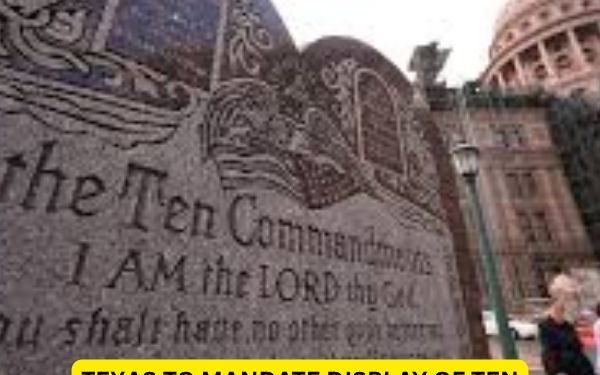Texas will soon require all public school classrooms to display the Ten Commandments, following the signing of a controversial new law by Gov. Greg Abbott. With nearly 6 million students across approximately 9,100 schools, Texas becomes the largest state to enact such a mandate—one that’s expected to spark immediate legal challenges.
Gov. Abbott announced the signing over the weekend, declaring it a move to “highlight historically important texts.” However, opponents say it’s a clear violation of the separation of church and state, and lawsuits are likely, especially after a similar law in Louisiana was recently struck down as unconstitutional by a federal appeals court.
The new Texas law, which sailed through the Republican-controlled legislature, mandates that every public school classroom must display a 16-by-20-inch framed copy of a specific English translation of the Ten Commandments. This requirement has stirred controversy, as translations and interpretations of the commandments vary widely among different religions and denominations.
State Rep. Candy Noble, a Republican and co-sponsor of the bill, defended the measure by claiming it reflects values foundational to America’s educational and legal institutions. Meanwhile, Gov. Abbott also signed a separate bill allowing school districts to offer daily voluntary prayer or religious text reading periods during school hours.
Critics, including Christian, Jewish, and interfaith leaders, argue the law undermines religious freedom, especially in a state with a highly diverse student population. A letter signed by dozens of clergy members condemned the bill, emphasizing that not all students have religious ties to the Ten Commandments, and such laws risk marginalizing non-Christian communities.
Texas has a long history with such debates. In 2005, then-Attorney General Abbott successfully argued before the U.S. Supreme Court to keep a Ten Commandments monument on the state Capitol grounds.
As legal challenges mount, all eyes are now on the courts—particularly the conservative-leaning 5th U.S. Circuit Court of Appeals, which has jurisdiction over both Texas and Louisiana and has previously struck down similar legislation.
Whether the law will withstand constitutional scrutiny remains uncertain, but its passage marks a significant moment in the national debate over religion in public education.










